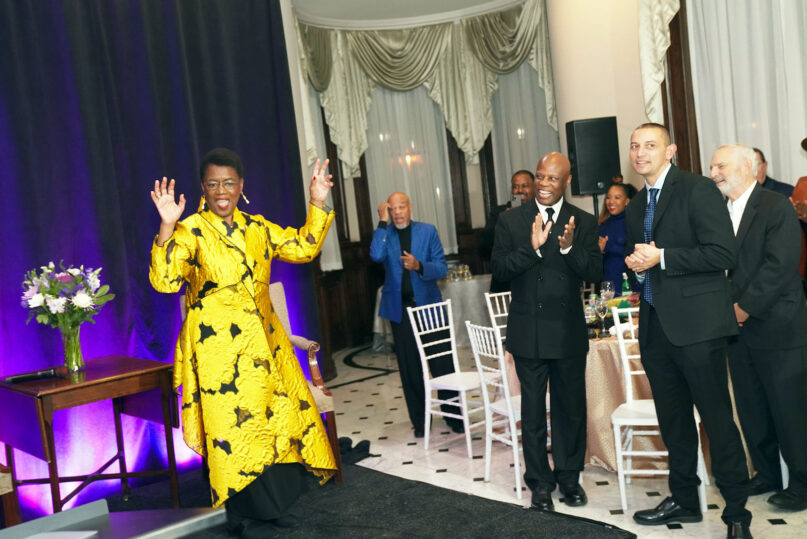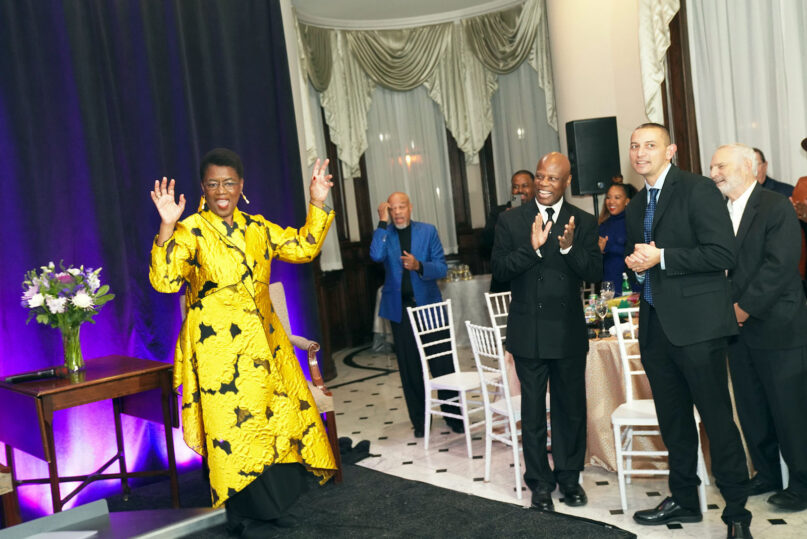
WASHINGTON (RNS) — When the Rev. Barbara Williams-Skinner celebrated her 80th birthday late last year with a party at the headquarters of the National Council of Negro Women near the National Mall in Washington, she asked for no presents. Instead, each attendee — clergy of different faiths, Washington insiders and young people she has mentored — left with a small gift bag containing a Faiths United to Save Democracy pin emblazoned with the words “No One Group, Faith, or Race, Can Do This Alone.”
Lest her guests think the pin was merely decorative, it was affixed to a postcard with a list of ways to join Skinner’s voter mobilization and protection initiative targeting 10 mostly battleground states.
“Everything I do is about advancement of people who are vulnerable,” she said Monday (Sept. 23), sitting in her home office in Washington with images of civil rights leaders she knew personally like John Lewis and Coretta Scott King. “I’m very goal oriented, I’m very mission oriented. So I would never have agreed to a birthday party just focused on me.”
That emphasis on the poor and neglected, and their historically limited access to the polls, is rooted in Williams-Skinner’s childhood in a depressed neighborhood in the San Francisco Bay area. She was one of eight children of Katherine Williams, a single mother who insisted that she spend six days of the week at church.
When she was 11, feeling alienated in a mostly middle-class Black Pentecostal congregation who treated her poor family with disdain, Williams-Skinner wrote her mother a letter of resignation. For a couple of decades, she considered herself agnostic and, for a time, “one mother’s prayer away from joining the Black Panther Party,” she said.
But her mother’s faith stuck with her and inspired her life of advocacy, which began as she studied social work in college. “That was really the first time I understood that, to escape poverty, I needed to take the focus off myself, my situation, and focus on people who didn’t have the mother who’s instilled values, who was strong, who gave me a sense of somebodyness,” she recalled.
Guests applaud the Rev. Barbara Williams-Skinner, left, during her 80th birthday celebration at the headquarters of the National Council of Negro Women, Dec. 4, 2023, in Washington. (Courtesy photo)
RELATED: Barbara Williams-Skinner on bridge building, voting, overcoming fear
Williams-Skinner said she “gained her voice” working as an intern for a Naderite consumer advocacy firm, a role that put her in front of the General Motors board, to urge them to integrate its membership. In the ’70s, after graduating from University of California Los Angeles law school, she returned to D.C. to be chief of staff for Ron Dellums, the California congressman who later became mayor of Oakland. While working on the Hill, she became the first woman executive director of the Congressional Black Caucus, refocusing it from a cloakroom group to one oriented “to see the whole nation of Black people as their constituents,” she said.
She also met the Rev. Tom Skinner, an evangelist, author and sports chaplain, and during their two-year courtship underwent a spiritual renewal. “When I met Tom, that was the first time I even wanted to talk to anybody who would talk about God,” she said. The two married in 1981.
With Skinner, who died from leukemia in 1994, she founded the Congressional Black Caucus’ annual prayer breakfast. Now called “A Day of Healing,” the event has become a key September date for politicians and clergy. She has also been active at the National Prayer Breakfast, and when the newly founded National Prayer Breakfast Foundation organized a scaled-down version of the event in recent years, she was a board member. She and Skinner also founded the Skinner Leadership Institute to mentor young professionals.
Her various organizations and causes — she also helped launch the National African American Clergy Network to partner with Black church leaders on increasing access to health care and bridging the digital divide through the Affordable Connectivity Program — are a testament to her power as a convener, which she customarily takes as a title, rather than “chair” or “president.”
“She’s the only one that can get every Black mega-church pastor, denomination leader, and member of the CBC in the same room!” Joshua DuBois, who directed the White House Office of Faith-based and Neighborhood Partnerships in President Obama’s first term, said in an email.
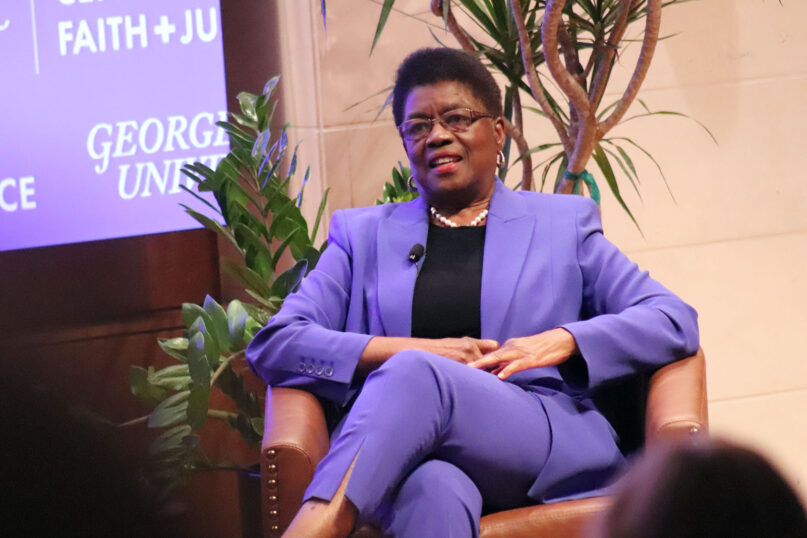
The Rev. Barbara Williams-Skinner participates in a “Mobilizing Faith” panel during the Test of Faith: A Summit to Save Democracy, Sept. 20, 2024, at Georgetown University in Washington. (RNS photo/Adelle M. Banks)
But her circles have come to extend far beyond Black clergy and causes. In the fight to get Congress to extend the child tax credit to low-income families, she joined leaders of the Catholic, evangelical and mainline Protestant faiths in 2022 to write letters to Congress. She organized a video and joint statement with Asian Christian leaders to condemn anti-Asian hatred after the spa killings in an Asian community in Atlanta in 2021.
“She realized that justice for the Black community could not happen without justice happening also for the Asian community,” said Hyepin Im, a Korean American laywoman who founded the Los Angeles-based Faith and Community Empowerment.
“These 400-plus anti-voting laws, they were not aimed at just Black people, she said at the Test of Faith: A Summit to Defend Democracy in Washington in mid-September, referring to recent restrictions passed in states on ballot access. “They’re aimed at the elderly person who had struggled now because she cannot do absentee mailing voting anymore because they cut that down in her state. It’s aimed at every Hispanic person who doesn’t have a language interpreter.”
Whatever the cause, her tactics are deeply rooted in faith. The Rev. Jim Wallis, the founder of the social justice organization Sojourners and longtime Williams-Skinner “co-convener,” recalled President Obama’s “drop by” at a 2011 White House meeting with Circle of Protection, a group that advocated for poverty measures in the federal budget. As Williams-Skinner called for a prayer, she reached across the table for Obama’s hand, Wallis said. The president stayed for far longer than expected.
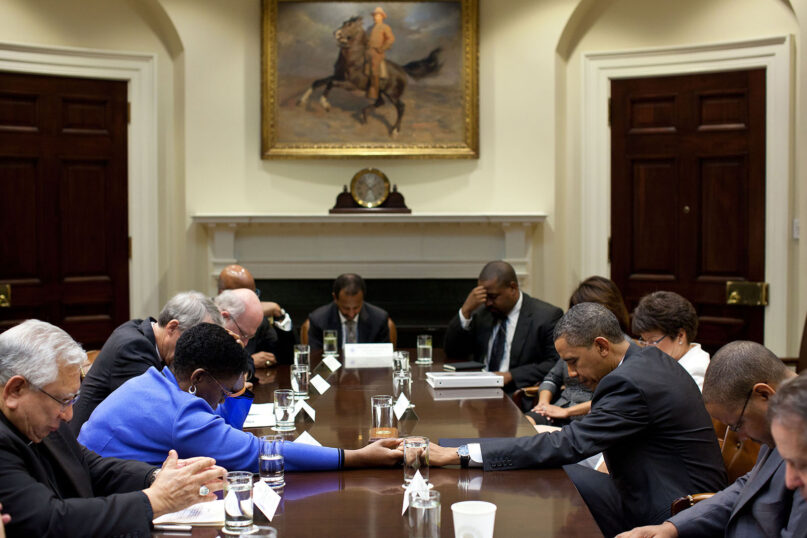
President Barack Obama, right, holds hands with the Rev. Barbara Williams-Skinner while praying with members of the Circle of Protection Campaign during a drop-by meeting with the faith-based leaders in the Roosevelt Room, July 20, 2011, in the White House. (Official White House Photo by Pete Souza)
“She’s a prayer warrior, and nobody leaves the room when Barbara prays,” said Wallis, now director of Georgetown University’s Center on Faith and Justice.
The Rev. Adam Taylor, Wallis’ successor as president of Sojourners and another co-convener of Faiths United to Save Democracy, said that for Williams-Skinner, faith is “the compass, the anchor, the motivator.”
Her public prayer life begins with a daily 8 a.m. telephone call, at which pastors, coaches and business leaders pray for “every war, catastrophe, whatever happens in our country, our elections, threats to democracy, attacks on Black people, immigration fiascos,” she said.
Hours before that call, she said, she awakens to pray on her own. “I also send Scriptures to about 60 members of Congress and other leaders after I pray by myself in the morning and center on what I should send them,” she said, offering that morning’s passage from the Bible’s fifth Psalm: “Oh, Lord, hear me as I pray. Pay attention to my groaning. Listen to my cry for help.”
Williams-Skinner, a self-care advocate, attributes her high energy level to being a “30-year-plus vegetarian,” spending time with family and herself and doing “Aging Backwards” exercises several times a week.
As she stretches herself physically, she has also continued to extend the range of people she works with.
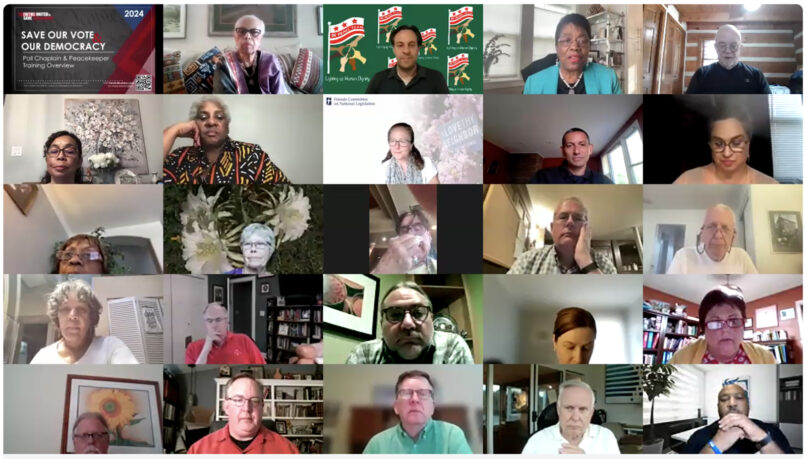
People attend an online poll chaplain and peacekeeper training session, hosted by Faiths United to Save Democracy, Monday, July 15, 2024. (Video screen grab)
Faiths United to Save Democracy was launched four years ago, she said, after a voter mobilization and poll-watching initiative enlisting Black clergy and attorneys called “Lawyers and Collars,” begun in 2018, had met with success. This year 500 clergy and lay volunteers of all backgrounds have already been certified as poll chaplains or peacekeepers and will be deployed across the country. Two more trainings are set for late September and early October.
Those numbers make it seem that her birthday party gift scheme has paid off. As she heads toward 81, Williams-Skinner is not planning to stop working after the election. “I’m just led by God on developing next-gen leaders,” she said.
“I have a number of people who could take my place tomorrow — today — because I believe that you should always be developing the next generation. And so that’s why I spend all the time I do with young people, because people like Dorothy Height and Coretta Scott King and Maya Angelou invested in me and helped me to become the woman that I am.”
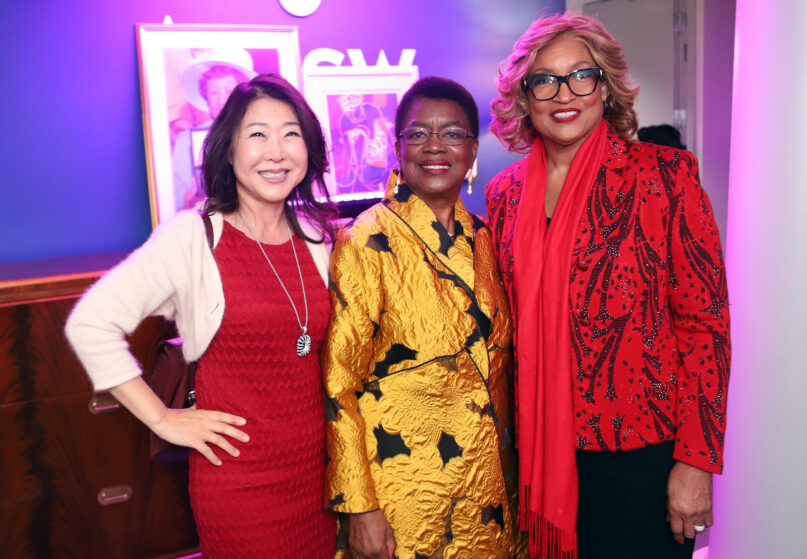
Hyepin Im, from left, the Rev. Barbara Williams-Skinner and Bishop Vashti McKenzie on Dec. 4, 2023, in Washington. (Courtesy photo)
Bishop Vashti McKenzie, president of the National Council of Churches, prayed for Williams-Skinner at her most recent birthday party, noting that the celebrant was “80 years looking like 60” and calling her the “Energizer bunny of the 21st century.”
“She’s praying and she’s working, emailing, planning, working out the kinks, developing partnerships, seeing things through.”
RELATED: Voter protection training begins as clergy, secular groups look toward election

